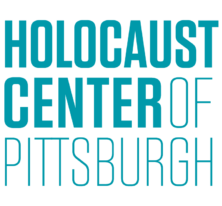
Photo by Brian Cohen
Profile by Julia Halvas
In times of crisis and devastation, it is human nature for communities to come together and grieve in unity, which is exactly what happened in Pittsburgh following the attack on the three Pittsburgh Jewish congregations in Squirrel Hill. For most people, grief is a long and heartbreaking process that takes time to process; however, this journey can be made better with the help of trauma therapists like Angelica Miskanin.
Pittsburgh resident Angelica Miskanin was at home in her pajamas when a friend wrote to her and asked if she was okay. This was how she found out about the tragedy unfolding in Squirrel Hill at the three Pittsburgh Jewish congregations holding services at the Tree of Life. Miskanin has dedicated a large portion of her career and life to aiding the members of the Jewish community in processing and coping with antisemitism and acts of violence. Her dedication and hard work has led her to a Righteous Among the Neighbors nomination this year.
“I worked closely with an Orthodox Jewish family as a non Jewish person,” she said.
After the shooting, Miskanin was offered a job at the Jewish Family and Community Services (JFCS) to help aid the Jewish population in Pittsburgh learning to grieve and cope with their trauma.
“My advocacy around the fight against antisemitism began when I took on this role at JFCS after the shooting,” she said.
After accepting the role as a trauma therapist with the JFCS, Miskanin began to work closely with Squirrel Hill residents by guiding victims and their families through this emotional rollercoaster. As Miskanin sat down with each of her patients, she began to bind closer to Judaism and the community as a whole.
“I didn’t want to shy away, no matter who I’m talking to, about the values of Judaism and what it is like to be a part of the Jewish community,” she said. “I tried to be an activist through the work I do as a therapist.”
The attack on the three Pittsburgh Jewish congregations has not only impacted Miskanin on a work level, but it has also guided her personal journey of converting to Judaism. Growing up in a Christian home, Miskanin admits that she never really learned much about Judaism from her family or even school. She had heard about the Holocaust as a child and would try to research about it, but she never really got a full understanding.
“Since coming to Pittsburgh, most of the friendships I have formed were people who just happened to be raised within the Jewish community,” she said. “I have learned quite a lot on my journey from those personal and intimate connections.”
Miskanin’s decision to convert to Judaism was not taken lightly, and she is happy to say that her family is supportive of her decision to convert. Miskanin admits that converting to Judaism has been “life changing.”
“After my childhood, I thought that I would never be able to align with any organized religion at all,” Miskanin admits, “but I did work very closely with Jewish individuals throughout my adulthood, and it kind of gave me a different perspective of education around religion.”
Miskanin’s journey with the Jewish community has not only impacted her work, but the life she continues to lead each and every day.
As the attack reaches its five year mark on Oct. 27, antisemitism still continues to sweep the nation. The Jewish community is still falling victim to hate crimes and violence from schools all the way to jobs and places of worship.
As Miskanin continues to help the victims of violence and trauma, she hopes to see more people from the younger generations stand up and fight against hate among all marginalized groups of people within their communities and even the world.
“In Judaism we believe that each person and every soul on Earth has a piece of the universe inside of them, and when we connect and help someone else, we are helping to save a piece of the universe.”
